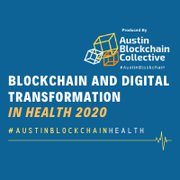|
By Pete Harris, Executive Director, Austin Blockchain Collective  I’ve known for a long time that healthcare relies on data in order to operate (no pun intended) effectively, safely and efficiently. It’s also been apparent that current processes to capture and share data are pretty much broken — one example that most patients can relate to are badly designed paper forms, usually partially completed with bad handwriting, and then faxed between providers. Some of it might end up being manually entered into an EMR system, mistakes and all, which of course can’t communicate digitally with similar systems at other providers. All that paper, manual processing and silo-ed databases will need to change, and not just to make healthcare delivery more efficient and less costly for payers and providers, and to offer better outcomes for patients. Here’s why … Healthcare is rapidly becoming a data-centric business. Not a data-driven business. Healthcare is a data business, as much as Bloomberg is, Carfax is, Google is. Its future lies as a vast big data business that just happens to leverage data in its attempts to help humans with their health challenges and make a profit doing so. Note: The central role of data in healthcare is a core topic of the Blockchain and Data Transformation in Health 2020 symposium. As Pamela Spence, Ernst & Young’s Global Leader for Health Sciences, Wellness Industry and Life Science, puts it: “We are moving from an era where health was a clinical science informed by data to one in which it is a data science supported by clinicians focused on individualized treatment.” It goes without saying that blockchain technology will play an important role in this digital transformation, helping to secure datasets, acting as a platform to aggregate and share data and perhaps also supporting cryptocurrencies that reward those (people and IoT devices) that provide their data and entities that process it. Of course, healthcare is not the only big data business that touches our daily lives often without affected individuals realizing. The more savvy among us have come to learn how major websites like Facebook, Google and Twitter as well as many smartphone apps harvest our data (often with our permission, provided unwittingly), and then sell it to advertising tech companies so that they can create profiles of individuals and target them with influential online advertising for their consumer product clients, political campaigns and even criminal enterprises.
0 Comments
World Class Keynotes from UCSD Health and IBM Kick Off Program Combining Academic Research and Insights from Innovative Blockchain and Healthtech Startups
AUSTIN, TX, January 27, 2020 — The Austin Blockchain Collective today announced its first Blockchain and Digital Transformation in Health 2020 symposium to be held on February 26, 2020, and featuring an educational program curated jointly with data and clinical experts from Dell Medical School at The University of Texas. The complete list of program includes two keynotes that will kick off the day and emphasize the unique academic and industry partnership of the symposium:
Among the academic research presented will be papers covering HIV prevention, managing stroke and delirium in hospitals, patient identification and consent systems, providing care to those experiencing homelessness, and generating updated evidence from published medical literature. “We are excited to have a number of outstanding researchers and academics share their expertise to highlight issues of great significance for the future of blockchain technology in health at the symposium,” noted Anjum Khurshid, Director of Data Integration, Department of Population Health, at Dell Med. “Bringing together UT Austin and Dell Med’s academics with Austin Blockchain Collective members will spawn a unique partnership where clinical experts work with technology experts to develop innovative solutions to major healthcare problems.” Industry insights and case studies will extend to a range of topics, including the creation of healthcare consortia, the management of clinical studies and trials, pharmaceutical supply chain traceability and visibility, management and integration of patient health information, reinventing current payer/provider/patient models and medical device lifecycle management. Technical focuses will consider public blockchains, decentralized applications and Web 3.0 architectures, the use of smart contracts for healthcare applications, and designing scalable and regulatory-compliant information architectures. “A particular topic for discussion will be the emerging narrative that positions healthcare as fundamentally a data science discipline, and which acknowledges the commercial value of health-related data,” said Austin Blockchain Collective Executive Director Pete Harris. “As Big Tech companies become increasingly involved in managing and leveraging health data, so data ownership, privacy and monetization issues and strategies have come to the fore, and blockchain and Web 3.0’s role in addressing these will also be explored.” Emphasizing the forward looking philosophy of the symposium, many blockchain and healthtech startups are contributing to the program, including AMCHART, BloqCube, BurstIQ, Citizen Health, Consensus Networks, ConsenSys Health, Digital Asset, EncrypGen, HASA, Lonestar Life Sciences, MedBlox, MedtoMarket, Open Health Network, Rymedi, Spiritus, Synerzip and Tribe Health Solutions. More than 100 senior healthcare industry and technology professionals are expected to attend. The symposium is especially targeted at those working in the following roles:
Registration for the symposium is open, with an academic rate of just $295 (including the educational program plus networking breakfast, lunch, breaks and end of business reception). Discounts are available for Dell Med and UT faculty and students, as well as for healthcare associates of Dell Med and members of the Austin Blockchain Collective. About the Austin Blockchain Collective The Austin Blockchain Collective has a mission to promote the City of Austin's credentials as a recognized global center of business, innovation and thought leadership in the blockchain technology space. Visit https://www.austinblockchaincollective.com to learn more. MEDIA CONTACT: Jen Massing Harris Massing PR, LLC for Austin Blockchain Collective +1 917 293 2405 [email protected] |
NewsTune in here for latest Symposium news and thought leadership. ArchivesCategories |



 RSS Feed
RSS Feed
